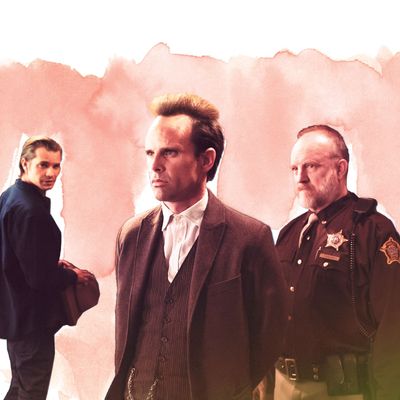
No great contemporary TV series is more flat-out enjoyable than Justified. The southern-fried crime drama, which wraps up its fourth season April 2 on FX, is as densely plotted as Game of Thrones; as brutal as Boardwalk Empire; and more consistently hilarious than almost any current sitcom. And it boasts some of the most musically ornate dialogue this side of the still-lamented Deadwood. ÔÇ£What precipitated this change in your weather vane?ÔÇØ demands Walton GogginsÔÇÖs toothy, scheming anti-hero, Boyd Crowder, a more musical way of asking, ÔÇ£What made you change your mind?ÔÇØ And yet for all its creative brio, Justified never seems full of itself. The show wears its considerable ambition the way its hero, Raylan Givens (Timothy Olyphant), wears his cowboy hat: as if itÔÇÖs no big deal at all. ItÔÇÖs an Elmore Leonard thing. The ┬¡Detroit-based fiction master started out writing Westerns and segued into modern crime thrillers. LeonardÔÇÖs original Raylan Givens story, ÔÇ£Fire in the HoleÔÇØÔÇöthe basis for JustifiedÔÇöcombined those modes; showrunner Graham Yost and coÔÇôexecutive producer Olyphant replicate them, along with LeonardÔÇÖs laid-back showmanship. Justified is a brazenly ambitious show posing (very convincingly) as a humble one. There are deep, dark things happening between characters, and within characters, but the show never puts anyone on a therapistÔÇÖs couch; with so many barstools and front porches around, it doesnÔÇÖt have to.
The series has never felt more kick-ass confident than during this recent season, which amounts to a summation of JustifiedÔÇÖs first four years. The central story is a glorified missing-persons case: Back in 1983, a D.ÔÇàB. CooperÔÇôlike fugitive named Drew Thompson, who saw a Detroit Mafia boss rub out a key witness in a racketeering case, went missing and was presumed dead; turns out he parachuted into Harlan County with money and cocaine and lived there for three decades under an assumed identityÔÇöthat of local sheriff Shelby Parlow (Jim Beaver), who outed himself as Thompson a couple of weeks ago and has been on the run ever since. The big reveal should have seemed obvious, but Beaver (a character actor best known for playing rock-of-decency roles on Deadwood and Supernatural) is such a warm, almost fatherly presence that the show deflected our suspicion for nine weeks.
The tale kicked off when a couple of junkies found a bag containing ThompsonÔÇÖs I.D. The discovery sparked a mad scramble to figure out which grizzled fiftysomething local was secretly Thompson, then arrest or kill him. Raylan and his boss, Art (Nick Searcy), knew that finding Thompson could lead to big promotions; the recently separated Raylan needs the pay bump, since heÔÇÖs got a kid on the way and has been moonlighting as a skip tracer when heÔÇÖs not drinking himself into a stupor and fighting with his girlfriendÔÇÖs bare-knuckle brawler of an ex-husband. The Detroit mob wanted Drew snuffed out, to protect the long-ago triggerman Theo Tonin (Adam Arkin), currently the Motor City mobÔÇÖs top boss. Boyd got in on the search, hoping to score enough reward money to exit the criminal underworld and go legit with his great love, Ava.
There was a secondary, parallel story about another missing person, the prostitute Ellen May (Abby Miller), who ran away after watching Ava kill an abusive pimp. That Ellen May and Drew Thompson eventually found each other felt poetically apt: Justified is filled with amusing or exciting romantic pairings, including Ava and Boyd (heels in love) and Raylan and Boyd (whose macho bromance could be titled Frenemies: a Love Story). The show hasnÔÇÖt stinted on action, either, serving up enough fistfights and gun battles to keep FXÔÇÖs core audience of young men happy. But when you peek beneath JustifiedÔÇÖs surface pleasures, itÔÇÖs a philosophical show obsessed with the weight of history on individuals. Raylan and Boyd and all the other major characters are still dealing with the psychic aftermath of their childhoods in Harlan County, which were marked by bloody, stupid feuds that werenÔÇÖt so much ended as paused. When RaylanÔÇÖs father, Arlo (Raymond Barry), gets stabbed to death in prison, itÔÇÖs a historical as well as a personal disruption, the supposedly dormant past igniting to blow a hole in the present. And ArloÔÇÖs death doesnÔÇÖt solve anything; the cruel old bastardÔÇÖs spirit lives within Raylan, a cop who could just as easily have been a criminal, just as the spirit of BoydÔÇÖs own bad daddy lives on in Boyd, a criminal who briefly became a fundamentalist preacher. ÔÇ£YouÔÇÖre only a lawman when it suits you, Raylan,ÔÇØ Hunter Mosley, the former sheriff, tells Raylan. ÔÇ£Gives you cover to do things you wouldÔÇÖve done anyway.ÔÇØ As Hunter (Brent Sexton) says this, the episodeÔÇÖs director, John Dahl (The Last Seduction), lingers on the heroÔÇÖs haggard face as itÔÇÖs lit by police lights, their red pulses expressing the rage that both drives and limits Raylan. In moments like these, Justified seems as astute a drama about the necessity and impossibility of reinvention as Mad Men.
But Justified never comes at you like a student looking for an A from the teacher. Its high-fiber bubblegum, so tasty-sweet that you never think of it as being good for the mind. Any given episode is likely to contain impassioned arguments about morality as well as gunfights, torture scenes, Whos on first?style absurdist exchanges, and declarations of undying love. I know this aint how most people do it, professing their love over a box of cash, Boyd tells Ava, proposing to her with a pile of money hes hoping to use as a down payment on a dream house. But the way I see it, you and me, Ava, well  We aint like most people. Justified aint like most shows.
Justified. FX. Tuesdays. 10 p.m.
*This article originally appeared in the March 25, 2013 issue of New York Magazine.


